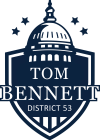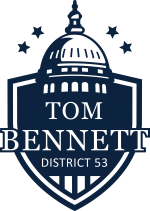Upcoming Events:
Tuesday, Sept. 10th, 2024 | 10:00 a.m. – 2:00 a.m.
ICASH Event with Senator Tom Bennett
See if you are owed money, and to receive help filing a claim.
Metamora Village Hall
102 N. Davenport St., Metamora, IL

Illinois Supreme Court Upholds Ruling Blocking Law That Limits Candidate Slating
The Illinois Supreme Court recently upheld a lower court’s ruling that blocked Senate Bill 2412, a controversial law signed by Governor Pritzker in May. The bill aimed to halt the practice of slating candidates to fill ballot vacancies for the current election cycle, even as candidates were already collecting petition signatures and rearranging their lives to run for office. Republican lawmakers criticized the bill as an attempt to benefit Democratic incumbents and reduce voter choice in the upcoming election.
Governor Pritzker’s legislative allies petitioned the court to revisit the earlier ruling, but the Illinois Supreme Court affirmed the lower court’s decision, declaring the law unconstitutional since it attempted to alter election rules after the election cycle had begun. If the law Pritzker signed had taken effect, it would have prevented numerous candidates from being placed on the ballot in the 2024 general election. The measure drew swift criticism from many, including good government advocates, who viewed it as a blatant power grab by Democratic lawmakers to give vulnerable incumbents an advantage in November.
Under the recent ruling, candidates who had collected the required number of petition signatures by the official deadline will now be placed on the ballot for voter consideration.
Senator Bennett, who opposed the bill in the Senate, expressed relief that the courts rejected yet another attempt by Pritzker’s allies to reduce voters’ choices and manipulate the electoral process.

Tax Credits Available for Parents and Educators
With students back in the classroom and a new school year underway, the Illinois Department of Revenue (IDOR) is reminding eligible taxpayers that they may claim back-to-school expenses for their K-12 students on their 2024 individual income tax returns. With the high cost of living and taxes placing significant strain on working families, every bit of financial relief counts.
The Illinois Education Expense Credit allows parents or legal guardians of a full-time K-12 student under the age of 21 to take a 25% tax credit on qualified education expenses over $250, up to a maximum credit of $750. Eligible expenses include tuition, book rental, and lab fees paid to the school where the student is enrolled full-time. For families who homeschool, book rental and lab fees that exceed $250 also qualify, provided they are part of an approved home school program.
In addition to the credit for parents, Illinois also offers the K-12 Instructional Materials and Supplies Tax Credit for educators. Teachers, instructors, counselors, principals, and aides working in a qualified school for at least 900 hours during the school year can claim up to $500 for out-of-pocket expenses on classroom materials. For educator spouses filing jointly, the maximum credit doubles to $1,000.
Additional information regarding both tax credits may be found by visiting IDOR’s website at tax.illinois.gov and Pub-112, Education Expense Credit General Rules and Requirements for Schools, Home Schools, Parents, and Guardians.

Illinois Sees Record Tourism Growth in 2023
The Illinois Department of Commerce and Economic Opportunity (DCEO) and the Illinois Office of Tourism recently reported that Illinois welcomed 112 million domestic and international visitors in 2023, resulting in $47 billion in visitor spending.
This is an increase of 1 million visitors and over $3 billion in spending compared to the previous year, according to data from Tourism Economics. In 2023, leisure travel in Illinois also saw notable growth, with an increase in overnight leisure stays statewide by 4.3%.
The influx of visitors also increased visitor spending, surpassing pre-pandemic levels and marking a 4% increase over 2019 numbers. The economic impact of this tourism activity, including indirect and induced effects, reached $83 billion, a 6.4% increase from 2022.
Currently, DCEO is offering $5 million in tourism funding opportunities through the Route 66 Grant Program and the International Tourism Grant Program to continue to boost tourism and cultural preservation across Illinois. To learn more, visit the DCEO website.

How much do we owe?
As of the time of this writing, the State of Illinois owes $1,675,931,138.68 to state vendors, including 17,469 pending vouchers. This figure represents the amount of bills submitted to the office of the Comptroller and still awaiting payment. It does not include debts that can only be estimated, such as our unfunded pension liability which is subject to a wide range of factors and has been estimated to be more than $139 billion. At the same time last year, the state’s accounts payable stood at a little less than $2 billion.

Did You Know?
Did you know that corn can actually “sweat”? Last week, NBC Chicago reported on a phenomenon called “corn sweat” and its role in creating extremely hot weather conditions. Heat indices are determined by both temperature and dew points, so anything that increases moisture in the air, like “corn sweat,” can affect them.
The Weather Channel explains that “corn sweat” is a process where plants release water vapor through evapotranspiration. This process typically peaks from mid-July to late August, with each acre of corn potentially releasing up to 4,000 gallons of water per day!
That’s a significant amount of moisture entering the atmosphere, which can raise dew points in regions with extensive farmland and make temperatures feel even hotter.
This Week in the 53rd District
Working full-time to represent you!

